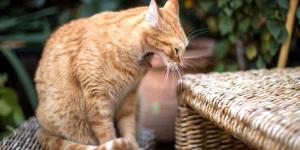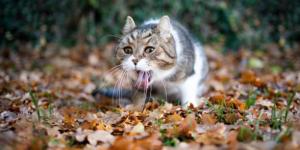My Cat Is Cooing Like a Pigeon

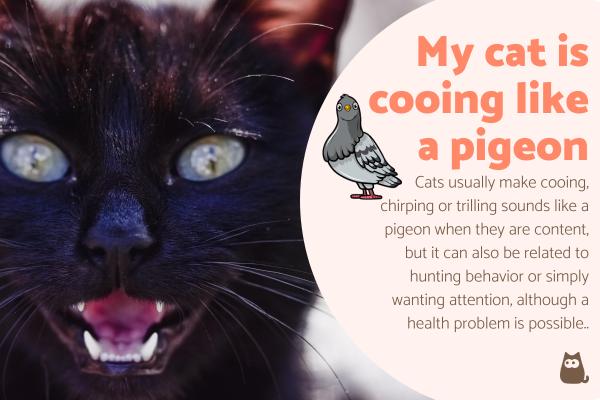

See files for Cats
Cats make many noises, but not all cats have the same vocalizations. Some are quick to purr, others will not be very vocal at all. Some cats even make noises like a pigeon. The type of vocalization a cat will make is influenced by many factors, including breed and health. Pigeon cooing is a relatively common sound made by domestic felines which have different interpretations by ethologists. Many of the reasons why a cat is making pigeon noises are related to their predatory instinct, but they can also reveal something about the relationship with their guardians.
AnimalWised investigates why my cat is cooing like a pigeon. We investigate the causes behind this distinct vocalization and whether there is anything we might need to do to address it.
What are cooing sounds in cats?
We have already explained that different cats make different vocalizations. Some are also simply not very vocal animals, preferring to communicate in other ways. A cooing sound is similar to a pigeon cooing, chirping or trilling. It often has a slight warble and can be very endearing.
It is very important to know that cooing is almost always a normal sound for a cat to make. While the reason the cat is making cooing noises will depend on the context, it is usually a sign of contentedness and even relaxation. It is often made when they are at rest, rather than actively moving around. It is also common to make pigeon noises when around their guardian, such as when they are being petted.
Only in some circumstances might a cooing or chirping sound indicate a cat is experiencing something negative. We will detail all possible reasons a cat is making cooing noises like a pigeon below.
Feeling happy and content
It is common that a cat is cooing like a pigeon when they are in a state of relaxation. The sounds are more drawn out and are often accompanied by purring. In fact, the coo can often be combined with a purring sound. While it is possible the reason why a cat is purring is due to a state of agitation, it is more likely they are feeling happy and content. This is especially evident if they are lying down or snuggling up with their guardian.
To know if a cat is happy, we need to look for additional signs to their cooing sounds. They may blink slowly, expose their belly to you, rub their head against you or generally show a state of relaxation. We often see a cat make cooing sounds when they greet you at the door, expressing their happiness at your return. They will not show signs of stress in cats such as flicking their tail back and forth quickly or making vocalizations such as hissing.
Knowing whether our cat is cooing because they are happy is something we will also learn as we get to know our cat. Each cat expresses their emotions in different ways. Once you know your cat's habits, moods and even vocalizations, you will see whether or not they coo out of contentedness.
Hunting instinct
Just as we have our own accents and vocal mannerisms, cats can make cooing noises in different ways. Sometimes they may be accompanied by purring, but it is common to see a cat making trilling noises when looking at something in the distance. This is related to the feline hunting instinct. When a cat spots potential prey, they will often make trilling, chattering or chirping noises which can sound a little like a pigeon cooing.
Trilling in this way is often witnessed when we see cats looking out the window. We don't know exactly why cats make this type of noise, but some studies suggest they do this to mimic the sounds of their prey[1]. A cat may want to mimic this sound to entice them near or at least pretend they are not a threat. Since birds are a common prey animal of cats, it makes sense they may make a pigeon sound.
Another reason for cats making this chirping sound might be simple excitement about the hunt. They are solitary hunters, so it will not be used to alert a pack, but it might provide some communication to other cats about their actions. It may also be a sign of frustration since it is often expressed when they cat is unable to physically catch the prey.
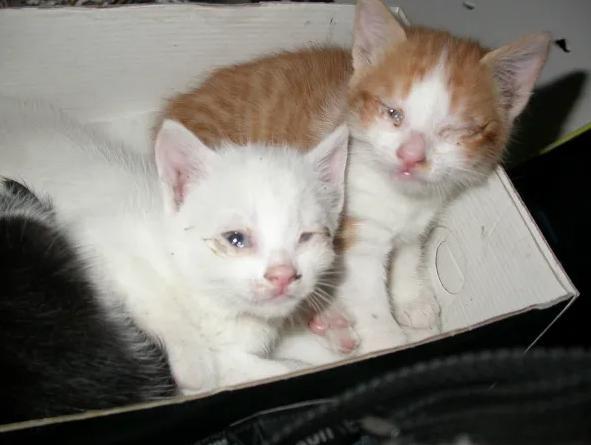
Mothering sounds
Another context in which a cat may make cooing sounds like a pigeon is when a female is with her kittens. It is the mother's role to provide protection and to keep them safe. Ensuring they are comfortable and happy is an important part of their care.
Making a cooing sound to their kittens is a similar expression of contentedness and relaxation to their human guardians. Domestic cats are not known to meow much to each other when they are adult, but it is a common vocalization in kittens as well as in human/cat interactions[2]. If a mother is cooing and purring with her kittens, it is a sign of reassurance. This can help them develop in a healthy way.
It is often said that cats view us as a parental figure, although they know we are not their actual cat mother.
Petition for attention
When a feline wants something, they have various methods of showing it. The cat may butt their head against you, run in between your legs or even meow constantly until they get what they want. Cooing is just another weapon in their arsenal when it comes to us bending to their will.
Since it is often an adorable sound, our cat may have seen us soften towards them when they make it. This is a learned behavior. They discover that a certain action elicits a certain response, so they will repeat it when they want to achieve said response.
Although it is common for a cat to petition us for food or other positive experiences, we need to ensure they are not lacking in their care. If a cat repeatedly coos at us like a pigeon, it could be that we are not providing enough. While this could be a lack of food, it might also be attention. Different cats need different levels of attention, so we need to assess their needs and meet them accordingly. If we do not do this, it can lead to behavioral problems.
Check out our related article on why a cat meows when they see me to learn more.
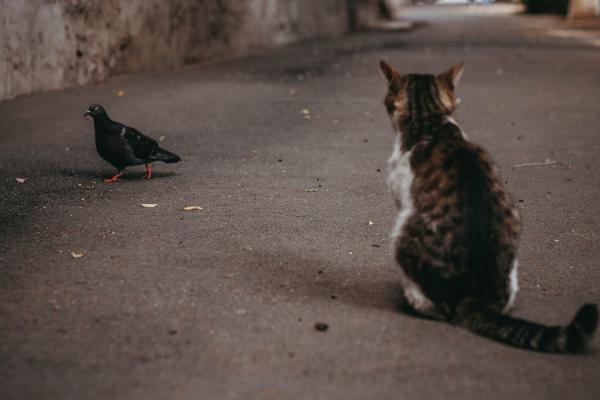
Health reasons why a cat is cooing like a pigeon
We have so far explored the reasons a cat is cooing which are related to instinctual feline behavior. While it is rare, it is possible that a cat is making a pigeon sound when they have an illness or similar health problem. In this cases, they are often related to their respiratory tract. This is because the cooing sound is made by forcing air through their airways, so it may be a symptom of one of the following health problems:
- Rhinotracheitis: this is a result of the Feline herpesvirus 1 (FHV-1) and symptoms can vary greatly in the cat. Some cats may have this virus and be completely asymptomatic. When symptoms to appear, they often present in the eyes with ocular discharge and conjunctivitis. It can also cause the cat's airways to restrict and result in cooing sounds. There is no cure for feline rhinotracheitis, but supportive treatment can help reduce symptoms.
- Brachycephalic syndrome: this is a genetic condition present in certain breeds which results in the cat having various morphological issues such as a shortened soft palate, snubbed nose and restricted airways. This restriction may result in them making this cooing sound more than others and in different contexts to those described here. Discover the different flat-face cat breeds which have brachycephaly.
- Nasopharyngeal polyp: usually of congenital origin, these are non-malignant growths which develop on nasopharyngeal mucosal tissue. They can change the vocalizations of a cat, causing them to make pigeon noises as a result. The normal treatment of such polyps is surgical.
- Laryngitis: when a cat's larynx is inflamed, it can also cause their vocalizations to change. We may see their meows are dryer or even of a different tone, but they also may make cooing sounds like a pigeon. Treatment depends on the cause. If it is of bacterial origin, antibiotics will be used. Corticosteroids may also be used to help treat the issue.
If you see your cat is cooing because they are relaxed, they spot a bird or are simply carrying out normal behaviors, you will not need to do anything. When this sound is uncommon to the cat, occurs suddenly or other symptoms develop alongside, speak to a veterinarian for diagnosis.

This article is purely informative. AnimalWised does not have the authority to prescribe any veterinary treatment or create a diagnosis. We invite you to take your pet to the veterinarian if they are suffering from any condition or pain.
If you want to read similar articles to My Cat Is Cooing Like a Pigeon, we recommend you visit our Breathing diseases category.
1. Fermo, J. L., Schnaider, M. A., Silva, A. H. P., & Molento, C. F. M. (2019). Only When It Feels Good: Specific Cat Vocalizations Other Than Meowing. Animals: an open access journal from MDPI, 9(11), 878.
https://doi.org/10.3390/ani9110878
2. Prato-Previde, E., Cannas, S., Palestrini, C., Ingraffia, S., Battini, M., Ludovico, L. A., Ntalampiras, S., Presti, G., & Mattiello, S. (2020). What's in a Meow? A Study on Human Classification and Interpretation of Domestic Cat Vocalizations. Animals: an open access journal from MDPI, 10(12), 2390. https://doi.org/10.3390/ani10122390



